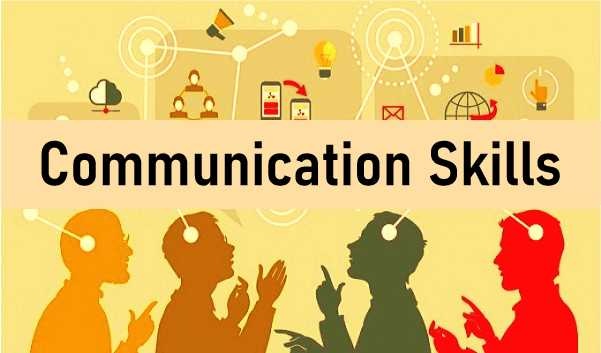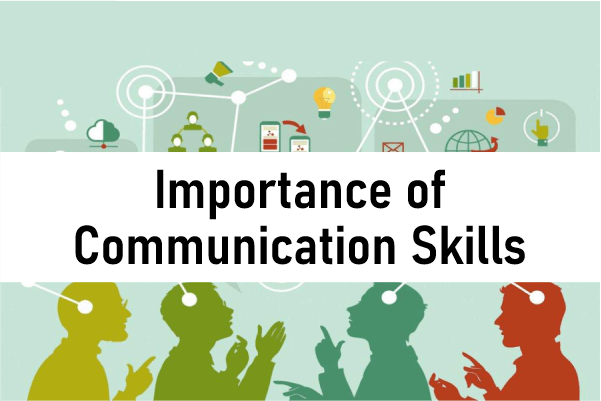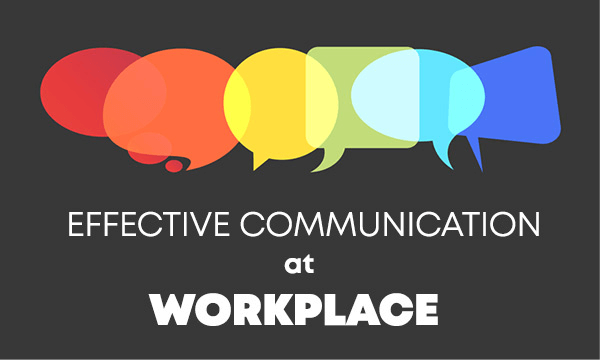Communication Skills DefinitionCommunication skills are the abilities you use to give and receive different forms of information. Examples include sharing original ideas, feeling something, or simply providing an update on your project. Speaking, listening, observing, and empathizing are the four Cs of communication. It's also helpful to understand how verbal communication-such as face-to-face meetings and phone calls-diffuses from digital communication-such as email and social media. 
Good Communication Skills for a Great CareerFor one to succeed in work, one must have effective communication skills. What they desire and how they aim to attain it must be crystal clear. Their job may flourish if they have strong communication skills. You may increase your chances of getting an interview and advancing further in the recruitment process by having strong communication skills. One gains a lot by having good communication skills. 
Discussing issues, requesting information, interacting with others, and having strong people skills are all necessary for performing your work well. These activities all fall under the category of good communication. They aid in clearly understanding the requirements of people close to you. Importance of Communication SkillsThe exchange of thoughts and information with the aim of improving mutual understanding is referred to as communication. This can be accomplished by verbal communication (dialog), written communication (texts, blogs, magazines), visual communication (figures, charts, and layouts), or non-verbal communication (body language, facial expressions, voice tone). All of these types of communication are soft critical skills for a strong job. 
The value of effective communication can be observed in both the business and personal life, as well as pretty much everything else in between. Communication skills are unavoidably necessary to allow for an open exchange of information between oneself and others. On the other side, if communication breaks down, a lot of misunderstanding and frustration can result. This article explains why effective communication skills are crucial in all aspects of daily life and the workplace and how to improve them. How To Improve Your Communication Skills?Communication abilities may be learned and enhanced with time and effort. After determining your strengths, focus on improving those areas 
Benefits of Communication SkillsCommunication skills have various advantages, many of which may not be immediately apparent but which yet have a significant influence on academic success and daily life in general. One of the primary reasons many students struggle is poor communication abilities. They affect a person's capacity to learn in schools and colleges as well as their capacity to understand what a teacher is teaching. 
Following are some benefits of effective communication as well as how important it is for students :
Although it may come easily to certain people, effective communication skills may also be acquired. Here is some advice on how to enhance your communication skills and succeed in both your personal and professional life, as well as information on the significance of communication skills. Benefits of Communiaction skills can be categorized into following : Communication Skills Improve the Body LanguageOur nonverbal cues, or body language, comprise a large part of our communication. How you present yourself while speaking to people matters a lot since it shapes how they see you. In order to ensure that your verbal and nonverbal communication is on the same page, you must pay attention to what your body is saying. Make eye contact when speaking to others, maintain your back straight, keep your shoulders open, and so on as basic guidelines to enhance your body language. These small changes can help you take advantage of your communication abilities and make your body language more hospitable and receptive. Communication Skills Develop EmpathyCommunication skills are crucial because they foster empathy. Two-way communication is essential. It's just as important to listen to others as it is to express your own ideas and feelings when it comes to communication skills for pupils. We may be more sympathetic and see things from their point of view when we pay attention to what the other person is saying. As a result, once you have their entire focus, they will start to pay attention to you and listen to what you have to say. Equal attention from both parties fosters an open conversation channel, underscoring the importance of communication skills. Communication Skills Improves ConfidenceCommunication skills are essential since they boost confidence. It contributes to our confidence and self-assurance in all we do to express our opinions effectively. A person's career can also be expanded by having strong communication skills because effective interpersonal contact is essential for the workplace. You may gain communication skills and feel more at ease in social situations by making eye contact, keeping a relaxed body posture, and speaking clearly. Also, one's self-esteem may be greatly improved by this. Most confrontations in life will thus be handled with poise and composure if you speak clearly and warmly. Communication Skills Enhances Interpersonal thingsCommunication skills are crucial because they help people get along better. One's interpersonal abilities may be enhanced, and relationships can become stronger with the help of effective communication. You will automatically come to talk to them in accordance with your audience if you are aware of who they are, how you feel about them, and the social context of the conversation. For instance, you could speak differently to your boss at work than to a buddy from your youth. Your verbal and bodily language, for example, are sure to differ significantly. Even if your boss is a buddy from your youth, you must approach them differently at work due to the nature of your professional relationship. Communication Skills Help in Teaching OthersCommunication skills are crucial since they enable you to teach others. Individuals who can effectively convey their ideas to others through oral, written, physical, and other forms of communication are always in a better position to do so. When we have something to say but are unable to articulate it well, the need for communication skills is felt most acutely. But, just like anything else, effective interpersonal communication is a talent that can be developed with time and effort. The clearest example to convey this idea is provided by the fact that all of your professors were once pupils. The number of individuals seeking your counsel and insights will astound you if you can express your understanding to them plainly. The capacity to impart knowledge in this way emphasizes the significance of communication skills for students as well, even if it may appear advantageous for persons who are professionals and masters in their field. Communication Skills Make You Open MindedCommunication skills are crucial because they help you to be open-minded. We can observe the world through other people's perspectives when we can communicate effectively with them. This broadens our thoughts as well as our compassionate sides. At first, this could seem not easy, but with a few ideas in mind, you can make sure that you maintain improving in this area. It's important to understand the other person's perspective when you disagree with what they are saying, whether it's a teacher, a student, or a friend, rather than just attempting to make your point. Be sure your statements don't accuse anybody or try to come out as threatening or derogatory. Never discount the opinions of others or ignore those who disagree with you. Sometimes they may be our most trustworthy ally and help us realize what we need to give some serious thought to truly. Remember to value the value of effective communication. Effective communication benefits us in all aspects of life, even when the advantages aren't always obvious. Being able to speak successfully gives you a huge advantage in a variety of situations, including getting an interview and moving forward in a job, developing interpersonal skills, and boosting one's self-esteem. Effective communication skills include talking about issues, asking for information, connecting with others, and having reasonable people skills. They will make you feel understood and allow you to attend to the needs of others around you. Advantages of Effective communication in the WorkplaceWhile there are several advantages to consider, they all help produce outcomes. These are some ways that success is increased by excellent communication: 
1. Fosters Confidence Leaders who set the bar for communication throughout the organization establish a good example for team members. The cooperation, cooperation, and trust that are fostered by these instances. When coworkers speak to one another honestly, a trustworthy workplace thrives. 2. Team Loyalty Team members are made to feel valued and appreciated when business leaders engage in intelligent communication with them rather than merely supervise them. Generally speaking, this emotion leads to greater loyalty and work satisfaction. 3. Increases Team Members Involvement Despite the fact that many businesses use innovative techniques to boost team member engagement, they frequently need to pay more attention to the fundamentals of honest, regular communication. Any number of strategies are permissible for a company. But, if leadership maintains an open communication channel with team members, those techniques are likely to succeed. 4. Fosters Better Collaboration Strong team ties are built on effective communication. To foster cooperation and peer connections, leadership should serve as an example of and actively encourage a culture of clear, direct, prompt, and compassionate communication. 5. Enhanced Productivity Team members committed to the project and clear about their tasks produce more work than disinterested teammates do. Members of the team who are uncertain of their responsibilities frequently grow upset or doubt their abilities. If the information is easily available and well presented, team members may carry out their duties more successfully. 6. Fosters Invention Coordination is aided by effective communication. Innovation reaches its full potential when team members are allowed to discuss ideas with their peers and the leadership. 7. Addresses Problems Internal problems are often resolved (or completely avoided) in teams with effective communication that encourages attentive, active listening as well as polite and professional replies. A team's success can only be enhanced by transforming potential disagreements into fruitful and positive discussions. 8. Better Client Connections When a business encourages effective communication among its workers, this good habit frequently transfers to successful encounters with consumers. Effective and pleasant communication may spread quickly. Consumers value clear and honest communication between the two sides, which only serves to increase customer confidence. Poor Communication in the WorkplaceSuccess in work is driven by communication. Poor interpersonal communication has long-term disastrous effects on the workplace, even if they may not be immediately apparent. These are a few indicators of poor communication: 
RadioShack's 2006 layoff notifications demonstrate poor communication. The 400 layoffs were announced through email to the workforce by the electronics chain. When the company made the switch, there was a lot of backlash from those who were startled that email had replaced face-to-face meetings. Poor communication resulted from Radioshack's usage of the incorrect channel for employee communication. Because they felt dehumanized by the organization, its employees hated it. ConclusionThe most crucial aspect is communication. In order to live a richer and better life, expressing one's ideas and feelings is crucial. We suffer less and feel better about everything around us the more we interact. It is vital to develop effective communication techniques to communicate one's position effectively.
Next TopicConsumer Definition
|
 For Videos Join Our Youtube Channel: Join Now
For Videos Join Our Youtube Channel: Join Now
Feedback
- Send your Feedback to [email protected]
Help Others, Please Share










